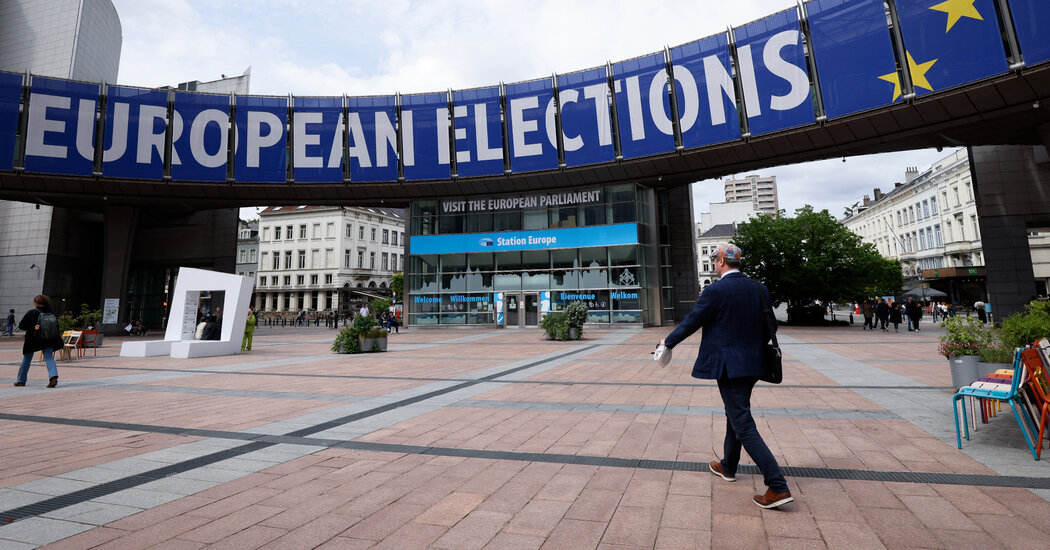Breaking News
How a Backlash Against Climate Action Is Reshaping Europe’s Election

Over the last five years, the European Union’s leaders have made significant efforts to position the 27-country bloc as a global leader in climate action.
They have achieved notable milestones, including the implementation of an ambitious target to reduce emissions by more than 50% by 2030, setting a deadline for the phase-out of gas-guzzling cars by 2035, and expanding the pricing mechanisms for industries emitting greenhouse gases.
However, as voters gear up for the upcoming elections, Europe’s environmental commitments are facing a new set of challenges.
There is growing frustration due to rising prices, protests from farmers’ groups against pollution limitations in agriculture, an increase in right-wing influence, and a decline in support for the Greens, who had previously made significant gains in parliamentary elections.
The outcome of the upcoming elections could have far-reaching implications not only for European citizens and businesses but also for the global community, given Europe’s historical contribution to pollution.
Laurence Tubiana, a key figure in the Paris climate accord and head of the European Climate Foundation, emphasized the importance of sustaining the progress made in the past five years.
Here are five key takeaways from the European elections.
The climate crisis faced new crises.
In the 2019 elections, the European Greens gained significant representation in the parliament, reflecting the growing focus on environmental issues.
The European Union’s approval of the European Green Deal with binding emission reduction targets signaled a commitment to environmental action.
However, unforeseen events such as the pandemic, inflation, and the Russian invasion of Ukraine shifted priorities.
The need to reduce dependence on Russian natural gas due to the war posed challenges for countries like Germany, impacting efforts to promote green technologies like heat pumps.
Political resistance and cultural conflicts further complicated the implementation of green initiatives, highlighting the delicate balance between climate action and economic concerns.
But warming didn’t stop being a problem.
Europe continues to experience accelerated warming and extreme weather events, underscoring the urgency of climate action.
While there is widespread support for environmental measures, concerns about costs and resistance to changes indicate a growing backlash against green policies.
The vote will matter for years.
The election outcome will influence the bloc’s emissions reduction targets for 2040 and shape future climate policies.
Key decisions on areas like home heating, transportation, and agriculture will determine the trajectory of Europe’s green transition.
The balance between environmental goals and economic considerations, as well as global competition in clean energy technologies, will impact Europe’s position in the green economy.
Political parties are shaping the narrative around the Green Deal, with varying interpretations and approaches.
While some parties claim credit for environmental initiatives, others criticize certain aspects as burdensome or unfair, reflecting diverging views on climate policy.
The upcoming elections will be crucial in determining the direction of Europe’s climate agenda and its impact on industries and competitiveness.
Changes have been ‘resilient’ (so far).
Despite challenges and opposition, progress has been made in renewable energy deployment, emission reduction efforts, and the transition to electric vehicles.
The European Union’s commitment to the Green Deal has shown resilience, but it faces significant political obstacles, particularly from right-wing factions.
Christopher Schuetze and Matina Stevis-Gridneff contributed reporting.
-

 Destination8 months ago
Destination8 months agoSingapore Airlines CEO set to join board of Air India, BA News, BA
-

 Breaking News9 months ago
Breaking News9 months agoCroatia to reintroduce compulsory military draft as regional tensions soar
-

 Tech News11 months ago
Tech News11 months agoBangladeshi police agents accused of selling citizens’ personal information on Telegram
-

 Breaking News9 months ago
Breaking News9 months agoBangladesh crisis: Refaat Ahmed sworn in as Bangladesh’s new chief justice
-

 Productivity11 months ago
Productivity11 months agoHow Your Contact Center Can Become A Customer Engagement Center
-

 Toys11 months ago
Toys11 months ago15 of the Best Trike & Tricycles Mums Recommend
-

 Guides & Tips9 months ago
Guides & Tips9 months agoHave Unlimited Korean Food at MANY Unlimited Topokki!
-

 Gadgets3 months ago
Gadgets3 months agoSupernatural Season 16 Revival News, Cast, Plot and Release Date






















